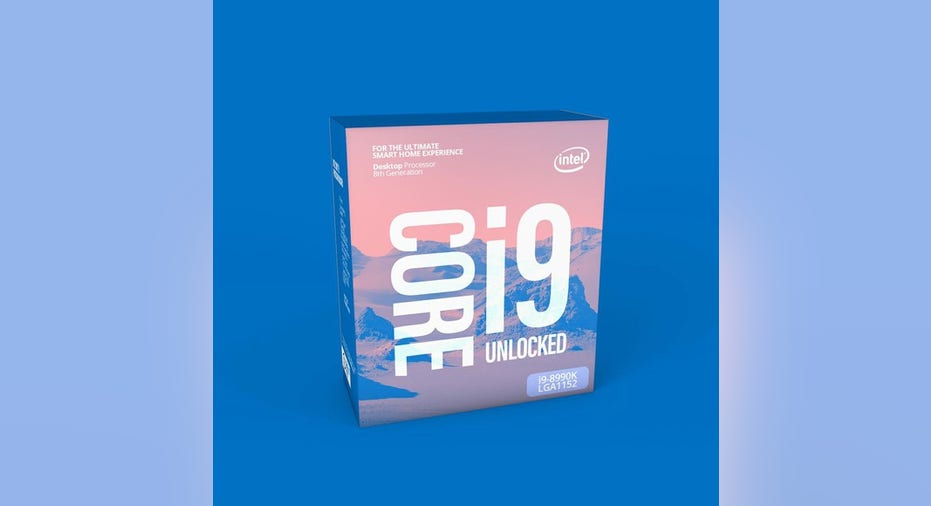Why This Intel Corporation Chip Rumor Seems Bogus

Over on social media, Richard Swinburne shared the following image, which he said came from a post from "Uruguay OC," also on social media:
Image source: Uruguay OC via social media.
This image purportedly represents the box art of Intel's (NASDAQ: INTC) upcoming Core i9 processor for gaming enthusiasts based on the company's Coffee Lake architecture.
At first glance, this looks legitimate enough -- the box art is awful, just as it has been with recent generations of Intel processors. The tag line of "FOR THE ULTIMATE SMART HOME EXPERIENCE" also sounds like something that Intel's marketing department would cook up.
However, there are a couple of things that don't quite pass the sniff test for me.
The model number seems wrong
Intel sells two lines of desktop processors to gamers and personal computer enthusiasts -- "mainstream" parts, and then "high-end desktop" (HEDT) parts.
The HEDT parts generally have model numbers in the form of i7/i9-X8XX and i7/i9-X9XX. Since the HEDT parts are positioned higher in Intel's product stack than the mainstream parts, the mainstream parts tend to have designations in the form of i5-X6XX/i7-X7XX.
Image source: Intel.
Based on that, I find the model number here (i9-8990K) suspect. Not only would this not allow Intel to launch HEDT parts with a leading "8" digit (since the second and third digits are both "9"), but such model numbering would make it appear to the average consumer that it is higher-end than the company's soon-to-be-launched HEDT chips that max out at i9-7920X.
Granted, Intel could say that customers could differentiate between HEDT and mainstream parts by looking at the suffix of the model number ("K" versus "X"), but that would probably create much more confusion than it's worth.
Not just the model number
It's not only the model number that doesn't make sense to me -- the socket that the box says it's designed for is suspect, too.
Chips designed for desktop computers can generally be swapped in/out, and the parts of the motherboard that the chips go into are called "sockets." Now, a user can't just take any chip and plug it into any socket -- a chip needs to be designed specifically for that socket for it to plug into it and work.
This leak indicates that this "i9-8990K" requires an LGA-1152 socket to work. Intel's sixth-generation and seventh-generation Core processors use the LGA-1151 socket, and the prior-generation fourth-generation Core chips (as well as the select fifth-generation Core chips that Intel launched for desktops) used the LGA-1150 socket.
On the surface, it would seem sensible to expect that if this pattern holds, the eighth-generation Core chips would require a new socket. Here's why I'm skeptical, though.
Back in January, Intel's motherboard partners launched a bunch of new motherboard designs based on Intel's Z270 chipsets. They were designed specifically to work with Intel's seventh-generation Core processors (older Z170-based motherboards could use the seventh-generation Core chips as well, and Z270 boards can use sixth-generation Core chips).
If Intel launches the upcoming eighth-generation Core chips in August, as DigiTimesclaims is happening, and if those chips aren't compatible with the Z270 boards, then the existing inventories of Z270-based motherboards sitting out there in the distribution channels would become virtually unsalable at anything resembling current prices.
At the very least, if the new chips can work in the Z270-based boards, then inventories of said boards would still be salable with relatively modest discounts.
This inventory situation wouldn't be as much of a concern in the case of eighth-generation Core incompatibilities if the Z270 boards were given a full lifespan, and/or the original plan of record called for Z270 to be "obsoleted" within seven to eight months.
However, since the reported August launch of the eighth-generation Core chips is said to have been a pull-in from the original schedule, I doubt suitable plans were in place to handle a potential inventory situation.
To that end, I think it's quite likely that the upcoming eighth-generation Core chips will plug into the same LGA-1151 socket that the sixth- and seventh-generation Core processors do, ultimately proving that the image that we're trying to analyze is a fake.
10 stocks we like better than IntelWhen investing geniuses David and Tom Gardner have a stock tip, it can pay to listen. After all, the newsletter they have run for over a decade, Motley Fool Stock Advisor, has tripled the market.*
David and Tom just revealed what they believe are the 10 best stocks for investors to buy right now... and Intel wasn't one of them! That's right -- they think these 10 stocks are even better buys.
Click here to learn about these picks!
*Stock Advisor returns as of May 1, 2017
Ashraf Eassa owns shares of Intel. The Motley Fool recommends Intel. The Motley Fool has a disclosure policy.



















